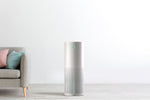House Smells Musty But No Mold? Causes and Solutions Explained
House Smells Musty But No Mold? Causes and Fixes
If your house has a constant musty smell, but there’s no visible mold, it can be frustrating. This persistent odor may be the result of hidden mold infestations, or it could stem from other factors like high humidity, poor ventilation, or undetected water damage. Even without visible mold, moisture and stale air can create that musty scent.
Addressing these issues with a dehumidifier and improving ventilation can help, but the most effective way to tackle musty odors is by using an air purifier with activated carbon filters, like Jaspr. This not only eliminates musty smells but also removes airborne mold spores, ensuring your home’s air is fresh and healthy.

Why Does Your House Have Musty Odors?
Musty odors are typically caused by excess moisture and poor air circulation, which create an environment where odor-causing bacteria, mold, and other microorganisms can thrive. Even if there’s no visible mold, these conditions can still create a musty scent. Here are some common reasons why your house might smell musty:
High Humidity Levels
When the air in your home is excessively humid, it can lead to condensation on surfaces like walls, floors, and ceilings. Moisture seeping into porous materials encourages the growth of microorganisms that produce musty smells.
Poor Ventilation
Homes with inadequate ventilation trap stale air and moisture, especially in confined spaces like basements, attics, and bathrooms. Without proper airflow, these areas become prime locations for musty odors to develop as moisture lingers.
Unmaintained HVAC Systems
If your heating, ventilation, and air conditioning (HVAC) systems are not regularly cleaned, they can circulate musty air throughout your home. Dust, debris, and moisture trapped in air ducts can contribute to stale, musty smells, especially when the system is running.
Hidden Water Damage and Mold
Even if you don’t see any visible mold, hidden water damage from leaks can create a musty odor. Water seeping into walls, floors, or insulation creates damp conditions that encourage the growth of mold and mildew, often leading to musty smells.
Where Does Hidden Mold Most Often Occur?
If you’re concerned the musty smell could be due to mold, here are some common places to check for hidden mold:
• Under Sinks: Leaks from plumbing fixtures, especially under sinks, can accumulate moisture, creating a breeding ground for mold.
• Behind Drywall: Water from leaks in plumbing or exterior walls can seep into the wall cavity, allowing mold to grow out of sight.
• Around Washing Machines: Moisture around front-loading washing machines, especially near the door seal or underneath the machine, can lead to hidden mold growth.
How To Eliminate Musty Smells From Your House
Getting rid of a musty smell requires identifying and eliminating the source of the odor. While you might be tempted to mask the smell with scented candles or diffusers, these products can add harmful chemicals to the air. Instead, take these practical steps to freshen up your living space:
1. Use Air Purifiers
The most effective and healthy way to eliminate musty odors is by using an air purifier with activated carbon filters, such as Jaspr. Activated carbon filters are specifically designed to trap and neutralize odors, including musty smells, by absorbing airborne particles and volatile organic compounds (VOCs).
Jaspr goes beyond just removing odors. It also captures mold spores that could be floating in the air due to hidden mold infestations. With its sleek design, Jaspr blends seamlessly into your home, while ensuring cleaner, healthier air, reducing the risk of respiratory issues.
2. Reduce Humidity Levels
Use a dehumidifier in areas with high moisture levels, such as basements, bathrooms, and kitchens. Reducing excess moisture helps prevent the conditions that lead to musty smells. Improving air circulation by opening windows and doors is another simple way to combat humidity.
3. Improve Ventilation
Regularly opening windows allows fresh air to circulate through your home, helping to flush out stale, musty air. Use fans to move air around the house, especially in areas where ventilation is poor, like basements and bathrooms.
Final Thoughts
A musty odor in your home can be more than just a nuisance—it could be a sign of hidden moisture or mold issues. The best approach to eliminating these odors is a combination of reducing moisture, improving ventilation, and using a high-quality air purifier like Jaspr.
By taking these steps, you’ll not only eliminate musty smells but also improve your indoor air quality, making your home healthier for you and your family.
FAQs
Can an air purifier really eliminate musty smells?
Yes! An air purifier like Jaspr equipped with activated carbon filters is designed to trap and neutralize musty odors by absorbing airborne particles and VOCs. Additionally, it helps capture mold spores that may be causing the smell.
Do I need a dehumidifier as well?
Yes, a dehumidifier is important for controlling excess moisture, which is often the root cause of musty smells. By reducing humidity, you create an environment less conducive to mold and odor development.
What’s the difference between using an air purifier and improving ventilation?
While ventilation helps by moving stale air out and bringing fresh air in, an air purifier actively cleans the air, removing odor-causing particles, mold spores, and VOCs. For comprehensive odor removal, combining ventilation with an air purifier like Jaspr is the most effective approach.
Why is my house musty if I don’t see any mold?
Even if you don’t see visible mold, musty odors can still result from hidden water damage, poor ventilation, or excess humidity. Mold spores and other microorganisms can thrive in these conditions, creating the musty smell.
Back to Blog


